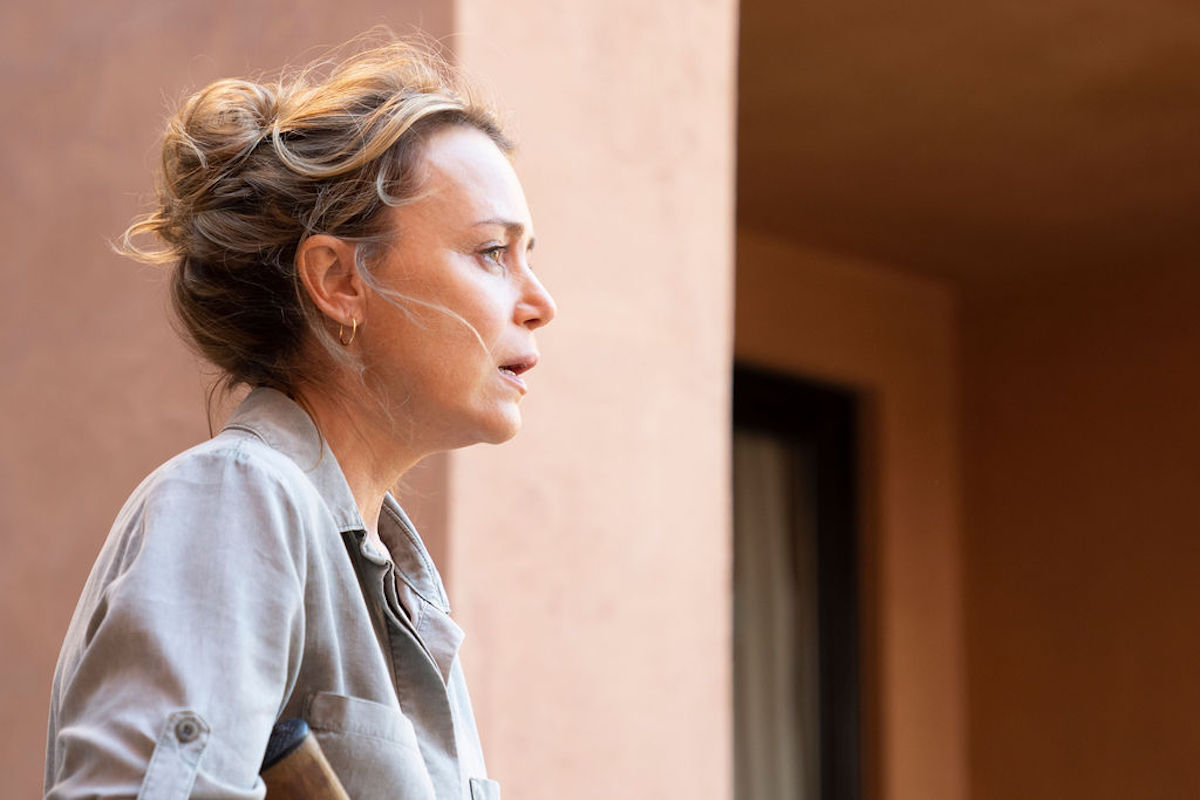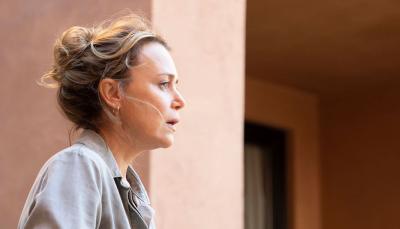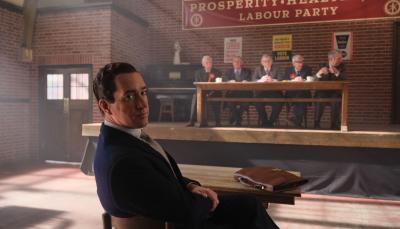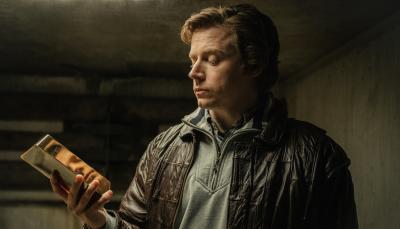Writer Louise Doughty on Centering the Stories of Victims in 'Crossfire'
Keeley Hawes and Anneika Rose in "Crossfire"
(Photo: BritBox)
BritBox’s Crossfire is a three-part thriller about every vacationer’s worst nightmare: A sun-drenched escape that quickly turns into a blood-soaked horror show when a group of would-be terrorists invades a picturesque resort and begins indiscriminately shooting guests and staff members.
The series follows the story of Jo (Keeley Hawes), a forty-something mother of three who is enjoying a much-needed holiday in Spain’s Canary Islands with family and friends when the unthinkable happens and shots ring out across their posh tropical paradise. Forced to make split-second, often life-or-death decisions, Jo and the rest of the hotel staff and tourists will face consequences that will reverberate throughout their lives.
But what sets Crossfire apart from many thrillers of its ilk is that its story doesn’t end once the violence does. Instead, the three-part drama spends roughly a third of its runtime on what comes next: how the survivors re-enter the lives they once knew, how they mourn those they lost, and how they heal in the aftermath of all that happened to them.
We got the chance to sit down with Crossfire writer — and bestselling author — Louise Doughty about the thrilling new BritBox series, from what inspired the story to how writing a television drama differs from watching her own work get adapted for the small screen.
The following interview has been edited and condensed for clarity.
Telly Visions: Let’s talk about Crossfire, which I just finished, and I have to tell you that was truly kind of harrowing to watch in places. (And I mean that as a compliment!) To me, it felt like this story bore some similarities to multiple real-life tragedies in recent years. And I know you didn’t necessarily base this story on a specific event, but what were you thinking about when you put this together?
Louise Doughty: It’s definitely not based on any real-life event. It’s completely invented. But I think what was possibly in the back of my mind is — I had a very close call with a terrorist attack when I was a young commuter in London. I was at London Bridge station when it was bombed in 1992. And what really struck me about that incident is how nobody can predict how they would behave [when something like that happens]. I wasn’t injured, but I saw injuries, and people close to me were injured. And I think I had always thought that I would be quite heroic — that, you know, I would rush to help an injured person. And then not a bit of it.
All the announcements started coming, you know, evacuate the station, evacuate the station, and I joined the evacuation. And there were two things that really struck me, apart from my own behavior and how I felt — one was London Bridge station is a massive interchange station. It’s underground. It must have 20 platforms. In the height of the rush hour, there were literally thousands of people there, and as we all flooded onto the concourse, these two very young policemen came running through the crowd towards the platform. They were the first responders on the scene. And I mean, these guys — I must have been about 27 or 28, and these guys were younger than me. And these two young men just piled through the crowd, not knowing what they were running towards.
And the other thing was the strange quiet. It really annoyed me later when a newspaper reported there was mass screaming and panic because everyone ran for their lives. That’s nonsense. Everybody was very calm, very quiet. All you really heard was the announcements and people’s feet on the concourse as they left. And it’s really stayed with me ever since — that idea that nobody knows how they would behave, and how it’s completely different from the way it’s reported and often sensationalized in the press.
And, I suppose, there’s also that strange thing of chance and contingency in all our lives. I’d had a choice of trains that morning, I was living on the outskirts of London, and I had been standing on the bridge for the suburban commuter train, and I watched these two trains go in, but because I chose one train, I was on an adjoining platform from where the bomb exploded. Whereas if I had made a different choice, I would have been right on the platform where a lot of people were injured. We never know what’s coming.
TV: I always think about the movie Sliding Doors.
Doughty: Very, very Sliding Doors. That idea just obsesses me. And for a while, as Jo says in Crossfire, I think when a massive event like that occurs, it can feel as though it stops time. The event becomes a pivot, and everything that happens before leads up to it, and everything that happens leads away from it. But of course, that’s not actually true. Time does stay linear, even if we feel it isn’t, and things keep happening. And what I suppose I feel incredibly strongly is that even people who’ve had the most horrific experiences like these, you know, a week later, they still have to go to the supermarket and get milk and bread and stand in a queue. How do you assimilate one of these kinds of enormous events into the context of your ordinary quotidian life? I think that’s really what Crossfire is about.
TV: Tell me a little bit about how you went about approaching not only covering such difficult material in specific scenes but keeping the tension of the larger show moving at the same time. You had to have a dozen plates in the air at any moment while you were writing this.
Doughty: That was no easy task. We were asking ourselves two questions: One, how do we keep the tension up? Because that’s the nature of television drama, you want to keep your reader watching. But at the same time, [you want to be] realistic and honor the trauma. And I suppose what I thought about a lot is, I’ve been on to a lot of those sorts of hotels. They’re very common in the Canary Islands. The whole coast is lined with these big resort hotels, and they’re all the same design, like a big horseshoe facing the sea with one exit.
And because I’ve spent a lot of time in those hotels, it really made me think if something went wrong, and you couldn’t get out, how this thing would go instantly from a kind of luxury resort to a sort of escape room. Particularly if you are separated from your family and your loved ones because then you’d be fighting your own instinct to get out but also your instinct to stay and find the people you cared about. So in that sense, it wasn’t hard to create the drama; it was just thinking about how awful it was for all these characters, multiple characters who were all separated from their families.
TV: I did love getting to watch Keeley Hawes be kind of an action star here. Tell me a little bit about how you see Jo and her journey over the course of the show.
Doughty: Jo is the main character, and it’s her journey. And what I wanted to do was create a character who, at the beginning of the story, I mean, she’s not a bad person, but she’s flawed. She’s got things going on in her personal life that are not particularly laudable. I think she’s one of these people who has a poor level of accountability for her own behavior. She’s always excusing her own behavior. She’s always saying to herself, oh, there’s no harm done. And she doesn’t really take responsibility for her own actions. And then, during the course of the show, she’s put in arguably the worst place of responsibility you can possibly be in, that of having to save your family and friends from gunmen and save complete strangers as well. So she has to discover her own inner resources.
TV: One of the things that I really loved about the show is that it’s not just three hours of them running around the hotel and shooting at people, and then the cops come, and they’re rescued, and boom, the show is over, and everything is fine, which is what many shows in this vein do. So much of Crossfire is about the survivors going home and trying to deal with everything that happened to them. Was that something that felt very important to you to include?
Doughty: Absolutely. And I’m so glad you highlight that because that is probably the most important thing about the show, as far as I’m concerned. The idea that most shows — as you quite rightly pointed out, they finish when the bad guys are dead. And that’s it. But to me, that comes back to what I was saying about honoring the real-life experience and the idea these are moments in people’s lives, and yet the consequences of what might only be a few brief minutes just ramble on and on for the rest of somebody’s life.
And you know, these characters live in a small town in the U.K., in Leicester, well, really a small city, but they have to come back and see their faces in the local newspapers. They still have to get on with their neighbors. How you even begin to process that is almost unimaginable. And including that was really, really important to me.
We spent the majority of [our] time on that final episode, and I knew it would be controversial because, obviously, we all prefer our adventures to be tidy, to be anecdotal. It’s comforting to us as viewers if the bad guys die and it’s all over. But real life is not like that. Real life is messy. And consequential. And I felt so passionately about that. And I was very lucky that the program makers, the producers, the director, and the broadcaster were all really on board with that because whenever I talked about this show, even from the very beginning, the first thing I said was we are dealing with the aftermath. It’s something we have to do.
TV: Did you have a favorite Crossfire character?
Doughty: Oh. That’s a tricky question!
TV: I know, I know, you love all of your children equally.
Doughty: I do love all my children! Well, it would be a bit of a cop-out to say Jo because she’s the main character, and obviously, she’s my favorite because I gave her the most lines. But beyond Jo, I’m very fond of the character of Amara, her daughter, her daughter, played by a wonderful young actress Shalisha James-Davis. And she has such talent. That scene in the middle of the show where she has to talk for her life when Amara is confronted by a gunman? Oh, man. I think that’s one of my favorite scenes in the show.
TV: Did you have a character that you wish you could have had more time to develop or focus on? (Basically, I just wanted more Ben before he died!)
Doughty: Oh, Ben, bless him, played by the fantastic Dan Ryan. He’s like a kind of national treasure over here. I mean, I killed off a national treasure! I think, to be honest, I just would have liked more time with them all. Every character. And if I was a more experienced television writer, I think I would have been in a position to ask for six episodes. But because I’m new to television, we decided quite early on it was going to be three episodes. But we wouldn’t have been able to structure it the same way. So, it would have lost some of the intensity, but I would have had more time with the characters.
TV: There’s been kind of a trend in media lately to…when bad people do a bad thing to just write them as sort of nebulously evil or bad in an unexplained way. What made you want to try to at least dig a little bit into why these attackers target this property?
Doughty: That was another really tricky one. Because I think the uncomfortable truth is that monstrous things are not always done by monsters. Quite often, they’re done by very ordinary people who’ve been turned monstrous by circumstance. There are bad people. There are people who are just psychopathic or monstrous, but the two young killers in Crossfire are not that, not really.
The idea is that both of these young men are from an abusive background. Their mother’s been murdered by their father. He’s doing jail time. When you look at the background of a lot of these attack killers or terrorist killers, you find you tend to find two things. One is almost always an experience of or a history of domestic abuse. And domestic abuse in the family is such an indicator of all sorts of things. And the other thing is often a history of petty crime. Quite often, young men, disaffected young men, they’ve not been the big man in the community. They’ve not been the big guy; they’ve been the petty criminal. They’ve been somebody who doesn’t really have status. But at the same time, this is a show about the victims. And while there have been a lot of very wonderful television dramas about the causes of such events and about perpetrators, I was very adamant that this was not the perpetrator’s show. This was the victim’s show.
TV: As an author, you’ve had one of your own works adapted for the screen — the thriller Apple Tree Yard. Was it more difficult watching someone else adapt your words or trying to write for TV yourself with something like Crossfire?
Doughty: It’s a lot easier watching someone else do the work! I was more than happy to [step back]. It’s like, here you go, honey. At the time, Apple Tree Yard was adapted by one of our top screenwriters over here, Amanda Ko. And I had never written for television. I mean, I just wouldn’t have had the technical skill. So I was more than happy to hand it over. But even after I’d written Crossfire…I have another one of my novels, Platform Seven, that’s currently being filmed as a four-part drama by ITV, and they did say, ‘you know, now we know you can do this, do you want to do it yourself? And I still said no.
I kind of think there should be a law against novelists adapting [their own work]. I just think it rarely ends well. I think that when you finish something and put it to one side, to return to it afterward and then take it apart, like a car engine and work out how it works, and remake it for another form… I mean, some writers do it very successfully, but I’m not sure I could. I think, to me, the two worlds are quite distinct. I have an idea and it’s either a novel or it’s a television drama, and the two are separate. So when it comes to the novels, I’m more than happy to…just, away you go, guys!
Crossfire is currently streaming on BritBox.





